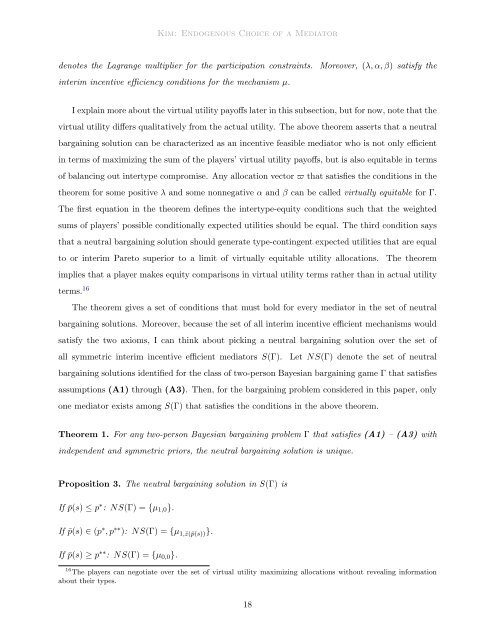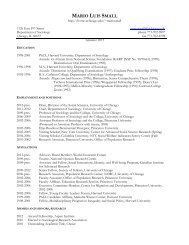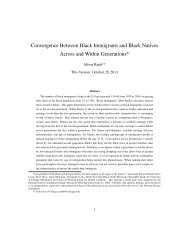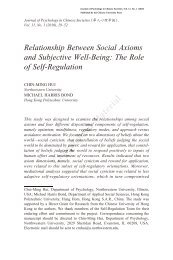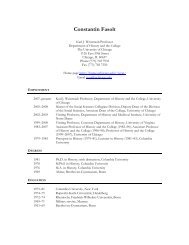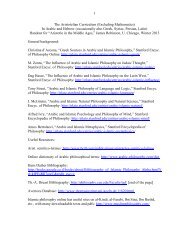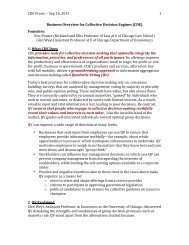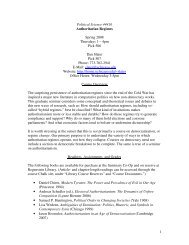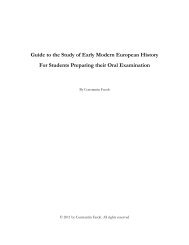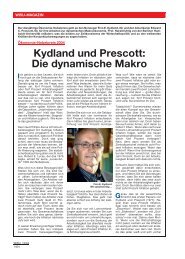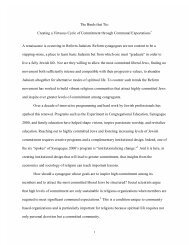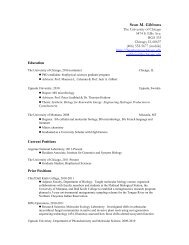Job Market Paper - Personal Web Pages - University of Chicago
Job Market Paper - Personal Web Pages - University of Chicago
Job Market Paper - Personal Web Pages - University of Chicago
Create successful ePaper yourself
Turn your PDF publications into a flip-book with our unique Google optimized e-Paper software.
Kim: Endogenous Choice <strong>of</strong> a Mediator<br />
denotes the Lagrange multiplier for the participation constraints. Moreover, (λ, α, β) satisfy the<br />
interim incentive efficiency conditions for the mechanism µ.<br />
I explain more about the virtual utility pay<strong>of</strong>fs later in this subsection, but for now, note that the<br />
virtual utility differs qualitatively from the actual utility. The above theorem asserts that a neutral<br />
bargaining solution can be characterized as an incentive feasible mediator who is not only efficient<br />
in terms <strong>of</strong> maximizing the sum <strong>of</strong> the players’ virtual utility pay<strong>of</strong>fs, but is also equitable in terms<br />
<strong>of</strong> balancing out intertype compromise. Any allocation vector ϖ that satisfies the conditions in the<br />
theorem for some positive λ and some nonnegative α and β can be called virtually equitable for Γ.<br />
The first equation in the theorem defines the intertype-equity conditions such that the weighted<br />
sums <strong>of</strong> players’ possible conditionally expected utilities should be equal. The third condition says<br />
that a neutral bargaining solution should generate type-contingent expected utilities that are equal<br />
to or interim Pareto superior to a limit <strong>of</strong> virtually equitable utility allocations. The theorem<br />
implies that a player makes equity comparisons in virtual utility terms rather than in actual utility<br />
terms. 16<br />
The theorem gives a set <strong>of</strong> conditions that must hold for every mediator in the set <strong>of</strong> neutral<br />
bargaining solutions. Moreover, because the set <strong>of</strong> all interim incentive efficient mechanisms would<br />
satisfy the two axioms, I can think about picking a neutral bargaining solution over the set <strong>of</strong><br />
all symmetric interim incentive efficient mediators S(Γ). Let NS(Γ) denote the set <strong>of</strong> neutral<br />
bargaining solutions identified for the class <strong>of</strong> two-person Bayesian bargaining game Γ that satisfies<br />
assumptions (A1) through (A3). Then, for the bargaining problem considered in this paper, only<br />
one mediator exists among S(Γ) that satisfies the conditions in the above theorem.<br />
Theorem 1. For any two-person Bayesian bargaining problem Γ that satisfies (A1) – (A3) with<br />
independent and symmetric priors, the neutral bargaining solution is unique.<br />
Proposition 3. The neutral bargaining solution in S(Γ) is<br />
If ¯p(s) ≤ p ∗ : NS(Γ) = {µ 1,0 }.<br />
If ¯p(s) ∈ (p ∗ , p ∗∗ ): NS(Γ) = {µ 1,¯z(¯p(s)) }.<br />
If ¯p(s) ≥ p ∗∗ : NS(Γ) = {µ 0,0 }.<br />
16 The players can negotiate over the set <strong>of</strong> virtual utility maximizing allocations without revealing information<br />
about their types.<br />
18


